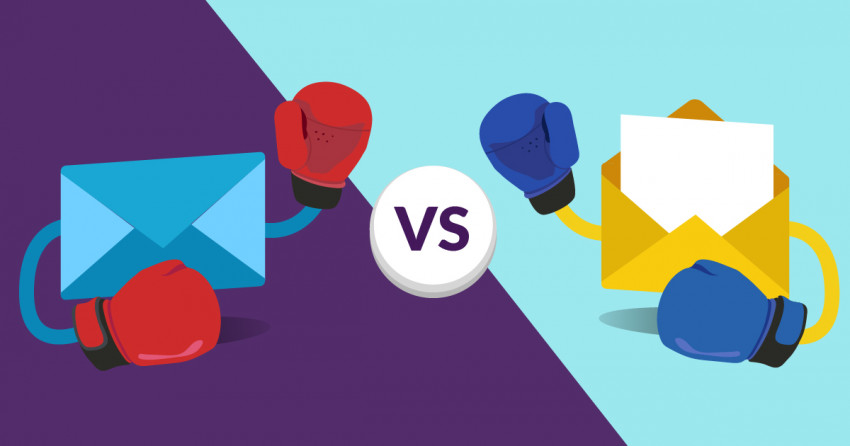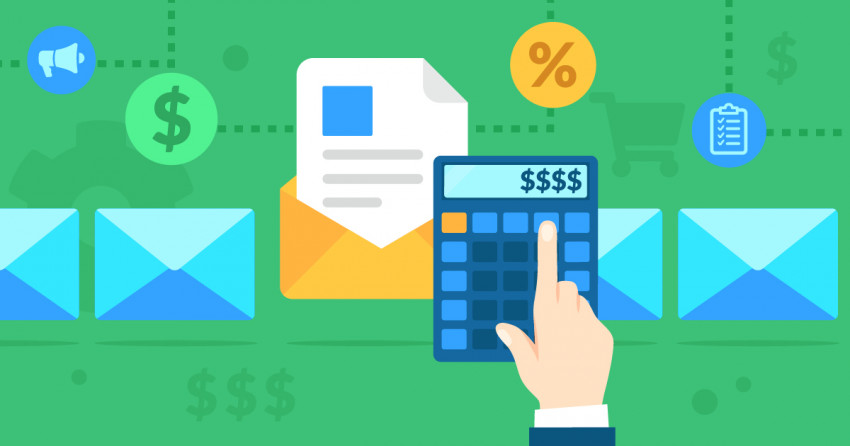Open Rates, Click Through Rates, and Deliverability
1. Email Open Rates Up, but Click Rates Down

From 2010 to 2016 in North America, email open rates increased by about 55%, while click rates declined by about 43%. This suggests that while email marketers have improved at writing compelling subject lines, consumers are not finding enough value to convert — and marketers need to do more today to reverse this trend and keep pace. (Also, keep in mind that it can also be linked to security concerns – people tend to be distrusting when it comes to links.)
2. Retail Email Click-Through Rates Need Improvement

In 2018, the global email open rate in the retail sector was 24.99% — but the average click-through rate was just 4.19%. This shows that less than one out of twenty customers who opened a retailer’s email found the offer engaging and relevant enough to convert. Indeed, there’s much room for improvement in how retail companies craft their email messages.
3. Consumers Love E-coupon Emails

Nearly 15% of Daily Deal/E-coupon emails are opened, with an unsubscribe rate of just 0.10%. E-commerce merchants, take note — don’t be afraid to deliver value to subscribers’ inboxes on a daily basis.
4. Email Newsletter Open Rates

Close to 23% of newsletter emails are opened, suggesting that this tactic remains an excellent way to force your way in front of your subscribers even when they aren’t seeking you out.
5. Email CTR vs Social Media CTR

Email CTR can be as much as 100x higher than CTR on Twitter or Facebook, demonstrating that as much as people love social networks, there is nowhere better to get their attention than in their own inbox.
6. Your Email Reputation Affects Your Deliverability

Improving your business’s reputation on Gmail can increase deliverability rates on the platform by up to 97% — an important indication that marketers should never be complacent with how platforms view them.
Segmentation
7. SMBs Need to Do Better With Email Data Analytics

An astounding 49% of SMBs said they don’t know where to begin using data in their email marketing. That means one in two SMBs aren’t taking full advantage of the analytics and segmentation capabilities offered by modern email service providers.
8. Segment Email Subscribers by Subscribe Date

Proving that even basic segmentation can have a huge impact, emails sent to a list segmented by subscribe-date are opened 29.56% more frequently.
9. Email Segmentation Boosts Open Rates

Properly segmenting your subscriber list can increase your open rates by as much as 39% — showing that while content may be king, distribution remains an important part of your strategy.
10. Lead Nurturing Email Open Rates

The click-through rate on lead-nurturing emails (8%) is more than double the rate for general emails (3%), underscoring the importance of not only segmenting your subscribers, but also reliving targeted content.
11. Email Subscriber Lists Impact Click Rates

Emails sent to segmented subscriber lists can increase click rates by as much as 59.99%, demonstrating just how important it is to deliver the right message to the right person at the right time.
12. Don’t Be Afraid to Ask a Lot of Questions on Your Email Subscriber Forms

Just by asking for a person’s name, email address, and birthday, you can increase conversion rates by as much as 10%, showing that driving conversions begins with pinpointing your audience as much as possible.
13. Automated Emails Perform Better Than Newsletters

The emails sent while running an automated email campaign to a targeted, segmented audience have 455% higher click rates than newsletter emails, demonstrating how effective the combination of automation and segmentation is when used correctly.
Consumer Email Preferences
14. Email Is Consumers’ Preferred Communication Method

Half of consumers prefer to communicate with brands via email, more than double the next more preferred method (direct mail, 20%). Just 7% prefer social media — proving that despite the hype, email remains the most important channel for customer-facing businesses.
15. Email Is More Popular Than Slack

Despite all the hype surrounding intra-office social networks, 72% of people said email remains their most frequently used channel to communicate with colleagues.
16. Email Frequency Matters

Across all industries, marketers send an average of five emails per month to consumers, meaning you should be sending at least one email per week.
17. Despite the Competition, the ROI of Email Remains Strong

In 2018, the ROI of every dollar spent on email marketing is $32, making it a channel that customers respond to and one of the most lucrative channels overall for businesses.
18. Email Is an Excellent Acquisition Channel

Email is the #1 customer acquisition channel for 81% of SMBs, and is also used by 80% as their primary retention channel, demonstrating email’s versatility.
19. Consumers Love Transactional Emails

Consumers open transactional emails (e.g., subscriber welcomes and order confirmations) eight times more frequently than they open regular marketing emails, making transactional emails crucial for getting in front of your audience as often as possible.
20. Promotional Messages Via Email Are Better Received Than Those Via Social Media

Seventy-seven percent of consumers prefer to receive promotional messages via email, versus 4% via Facebook and just 1% via Twitter. This shows email’s dominance as a sales channel.
21. Consumers Love Promotions Via Email

Forty-four percent of consumers stated they actively search for promotional emails in their inboxes, making email one of the few places where people are looking for brands to contact them with marketing messages.
22. In the Era of Multi-Channel, Email Is Still Effective

Email marketing was rated the most effective marketing channel by 64% of companies, demonstrating that companies increasingly see it as more important than other channels like social media.
23. Email Helps You Acquire Customers

Email is 40x better at acquiring new customers than Facebook or Twitter, showing that it’s not just a bottom-funnel channel.
24. Order Values Are Higher Via Email

The average order value of a customer through email is 17% higher than through social media, meaning that marketers shouldn’t be afraid to send emails that ask for conversions.
25. American Consumers Interact With Brands on Email

U.S. consumers will interact with 11 brands through email every day — showing that even though the inbox is a crowded place, there’s a lot of wealth to spread around.
Subject Lines
26. There IS a “Most Annoying” Email Subject Line

For one out of every four people, the most annoying subject line that arrives in their inbox is “Not sure if you saw my last email” — strong evidence that people want emails to have simple, direct messaging.
27. Use Personalized Subject Lines in Your Emails

Emails with personalized subject lines are opened 26% more frequently than those without personalized subject lines, reinforcing the notion that email’s intimacy is a huge factor in its success as a communication channel.
28. Email Subject Lines Need the Important Keywords First

Placing important keywords at the start of a subject line can increase open rates by as much as 20%, showing the importance of writing copy that immediately demonstrates value to the reader.
29. Wit and Humor Make For Better Email Subject Lines

Adding wit, humor, puns, or anything else that makes a subscriber smile to subject lines can increase open rates by as much as 40%, showing just how valuable it can be for your email to stand out from all the other generic marketing messages.
30. Email Subject Lines Should Be Short

Writing a subject line of 21 characters or fewer can increase open rates by 31% above the average, showing why marketers need to keep their subject lines as short as possible. Unfortunately, only 5% of emails sent are this short.
31. The Length of Subject Lines Impacts Click-to-open Rates

The click-to-open rate for subject lines with fewer than 21 characters is 12.9% — a 50% increase over subject lines with 21-60 characters. This further stresses the importance of brevity.
Mobile
32. Consumption Is Higher on Mobile than on Desktop

Mobile is already the king of email, with more than half (55%) of all emails being consumed there. Next comes webmail, at 28%. Just 16% of emails are opened on a desktop computer.
33. The iPhone/Android Email Wars Continue

iPhone owns 28% of the email client market share, just enough to edge out Gmail’s 26%. Optimizing your emails for both iOS and Android is a must.
34. Email Load Times Are Crucial

Three seconds is the amount of time users are willing to wait for an email to load on mobile. Any longer, and they’re likely to delete the message before it’s delivered.
35. Mobile Email Orders Offer Improvement Opportunities

The average value of an email order placed via mobile is $56 — 40% lower than the average value of an email order placed via desktop ($95). Given mobile’s popularity, this proves that mobile email marketing tactics have room to improve.
Automation
36. Automation Drives Email Revenue Higher

Email automation is responsible for 13% of all the revenue generated from email marketing, underscoring the importance of using advanced email techniques.
37. Interactive Email Experiences Are Increasingly Popular

Over 44% of marketers reported intending to create more interactive email experiences as a top priority in 2018. Just 12% said they intended to send out more text-only emails. Despite the intimate nature of the inbox, there’s a sense you still need to be as engaging as possible to capture attention.
38. Autoresponder Emails Work

The average click-through rate (CTR) for autoresponder emails sent to cart abandoners was 6.5%, with just a 0.18% unsubscribe rate. This proves that you shouldn’t be afraid to nudge customers toward completing their purchases.
39. People Love Getting Email on Special Occasions

Sending regular emails during lifecycle events such as birthdays and holidays has the potential to boost revenues by up to 20%. A recommended best practice involves dispatching a message accompanied by a special discount offer. This approach capitalizes on the unique occasion, imbuing the email with a less overtly promotional tone. Moreover, it often aligns with recipients’ positive moods, rendering them more open to the idea of making a conversion.
40. Trigger Emails Are a Must for Retailers

Trigger emails have a 19.6% open rate in the retail industry, which is far higher than nurturing emails (3.7%) or batch emails (3.9%) — a clear endorsement of the value of email automation.
Transactional Emails
41. Transactional Email Drives Conversions

Transactional emails are 20% more effective at converting subscribers than regular marketing communication messages, proving that including additional value and calls-to-action is a must.
42. Consumers Pay Attention to Special Email Promotional Offers

Seventy-eight percent of consumers say they click through to marketing emails that include special promotional offers or coupons for products relevant to them — another example of how providing value tailored to your recipients can increase engagement.
Personalization
43. Wish Your Subscribers a Happy Birthday via Email

Using the word “birthday” in email titles can boost a company’s open rate by 43.5%, further emphasizing the value of personalized messaging in email.
44. Use Email to Drive Social Media Engagement

Providing a link to one or more social media accounts can increase click rates by as much as 55%, highlighting the value that consumers place on social proof and networking.
45. Use First Names In Your Emails

Companies can increase their open rates by as much as 16% simply by personalizing their subject lines with the first name of their subscriber.
Unsubscribe Rates and Bounce Rates
46. E-commerce Email Subscribers Are Loyal

The average unsubscribe rate for e-commerce and retail business is approximately just 0.12%, demonstrating the longevity of your relationship with a customer once you get them on your list.
47. The Global Email Unsubscribe Rate Is Low

Globally, the average email unsubscribe rate is just 0.2%. This low rate demonstrates email’s importance because it means you’ll have converted 99.8% of your users’ attention over the long-term. Conversions on other sales and marketing channels are either one-time conversions (PPC), or have a value that’s not guaranteed (such as social media, where organic reach is constantly being curtailed in favor of pay-to-play).
48. Retailer Email Bounce Rates Show Consumers Are Listening

The average email bounce rate for retail companies is 0.79% — significantly lower than the 1.04% overall average. This serves as an indicator that consumers want to connect with retail brands.
15 Additional Stats
- It is predicted that there will be 4.3 billion email users by 2023.
- By 2022, data suggests there will be a total of 347 billion emails sent everyday.
- Spam messages made up 54% of all emails sent in March 2020.
- People choose to unsubscribe from emails lists for two primary reasons: There are too many emails (26%) and/or the emails are no longer relevant (21%).
- Customers spend a lot more (138%) when targeted through email.
- 16% of emails never make it to the recipient’s inbox.
- 67% of customers would be willing to provide an email address in exchange for free shipping or a $5 gift card.
- 38% of people would prefer emails containing product ratings.
- Infographics are the fourth most common media form in content marketing. The only formats used more are videos, blogs and eBooks.
- 51% of companies send automated emails.
- Marketers who send segmented emails experience a revenue increase of 760%.
- The majority of opened emails (61%) are read for 8 seconds or more, whilst almost a quarter are skimmed (2-8 seconds).
- 38% of list subscribers would like to receive emails more frequently.
- Boredom is the number one reason most people check emails.
- 47% of marketers believe automation provides them great value.
Sources
https ://www.marketingcharts.com/industries/pharma-and-healthcare-73758/attachment/epsilon-email-open-and-click-rates-q32010-q32016-jan2017
https ://www.getresponse.com/resources/reports/email-marketing-benchmarks.html
https ://mailchimp.com/
https ://blogs.constantcontact.com/interpret-email-reports/
https ://theblog.adobe.com/love-email-but-spreading-the-love-other-channels/
https ://www.slideshare.net/adobe/2018-adobe-consumer-email-survey
https ://www.emarketer.com/Article/Mobile-Has-Largely-Displaced-Other-Channels-Email/1016657
https ://litmus.com/blog/email-client-market-share-trends-first-half-of-2018
https ://i.marketingprofs.com/assets/images/daily-chirp/180514-infographic-hyper-personalization-full.jpg
https ://www.emailmonday.com/future-of-email-marketing-automation/
https ://blog.salecycle.com/post/the-remarketing-report-q1-2018/
https ://www.smartinsights.com/email-marketing/email-communications-strategy/statistics-sources-for-email-marketing/
https ://www.hubspot.com
http ://www.marketingprofs.com/charts/2016/29374/the-state-of-email-marketing-by-industry
https ://www.oberlo.com/blog/email-marketing-statistics
http ://www.experian.com
https ://blog.marketo.com/
https ://www.mckinsey.com/business-functions/marketing-and-sales/our-insights/email-marketing-think-inside-the-new-inbox
https ://optinmonster.com/email-marketing-vs-social-media-performance-2016-2019-statistics/
https ://www.mailmunch.co/blog/email-marketing-vs-social-media/
https ://www.mckinsey.com/business-functions/marketing-and-sales/our-insights/why-marketers-should-keep-sending-you-emails
https ://www.yesmarketing.com
https ://www.superoffice.com/blog/email-marketing-strategy/
https ://neilpatel.com/blog/email-marketing-segmentation-strategies/
https ://www.omnisend.com/blog/ecommerce-email-marketing-statistics-infographic/
https ://www.statista.com/statistics/457981/e-mail-marketing-unsubscribe-rate-by-industry-worldwide/
https ://www.mailjet.com/support/what-is-a-good-unsubscribe-rate,77.htm
https ://emarketingplatform.com/email-marketing-metrics-benchmarks-2016/
https ://www.everycloudtech.com/giant-email-marketing-statistics-guide




![10 Best Email Marketing Software for Ecommerce [2025 Update]](https://dt2sdf0db8zob.cloudfront.net/wp-content/uploads/2023/08/Best-Email-Marketing-Software-for-Ecommerce-850x446.jpg)
![Keap vs Mailchimp: Which Offers Better Value? [2025 Update]](https://dt2sdf0db8zob.cloudfront.net/wp-content/uploads/2023/06/Keap-vs-Mailchimp-850x446.jpg)

![Drip vs Mailchimp: Read Our Advice Before You Sign Up [2025]](https://dt2sdf0db8zob.cloudfront.net/wp-content/uploads/2022/10/Vs-1-850x446.jpg)
![Drip vs Mailchimp: Read Our Advice Before You Sign Up [2025]](https://dt2sdf0db8zob.cloudfront.net/wp-content/uploads/2022/08/Emily-Robin.jpg)
![MailerLite vs ConvertKit: Read This Before You Sign Up [2025]](https://dt2sdf0db8zob.cloudfront.net/wp-content/uploads/2022/10/Vs-850x446.jpg)


![Drip vs. AWeber: Who Offers the Best Value for Money [2025]](https://dt2sdf0db8zob.cloudfront.net/wp-content/uploads/2022/04/Drip-vs-AWeber-850x446.jpg)
![Drip vs. AWeber: Who Offers the Best Value for Money [2025]](https://dt2sdf0db8zob.cloudfront.net/wp-content/uploads/2021/08/Emma-Ayres-150x150.jpg)
